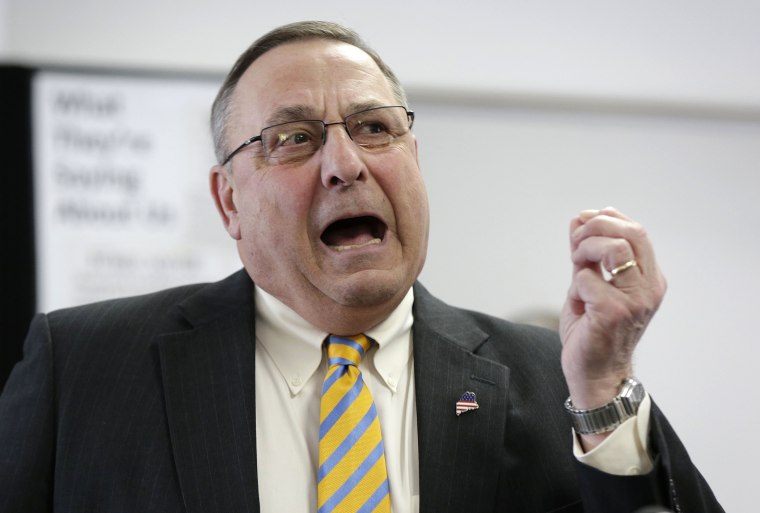It's not at all common for a politician to say a written statement was misquoted, but Maine Gov. Paul LePage (R) remains a highly unusual political figure (thanks to Gerald Weinand of Dirigo Blue for the tip).
A day after issuing a statement that equated Social Security with welfare and touched off a wave of political criticism, Gov. Paul LePage sought to clarify the statement Thursday, saying he doesn't actually believe that. LePage criticized the Portland Press Herald for making an "erroneous interpretation" of a media release that his office issued Wednesday. It dealt with a report from the U.S. Bureau of Economic Analysis showing that Maine's personal income growth was below the U.S. average and last in New England in the first quarter of 2014.
Federal officials responsible for measuring economic growth recently found that Maine trails other states in New England on personal income. The Republican governor's office said the data is misleading: the data includes income from social-insurance programs like Social Security, Medicare, the Affordable Care Act, and unemployment insurance.
And for LePage, economic security through social-insurance programs shouldn't count.
"It doesn't matter what liberals call these payments, it is welfare, pure and simple," the governor said in a written press release. "Liberals from the White House all the way down to Democratic leadership in Augusta believe that redistribution of wealth -- taking money from hard-working taxpayers and giving it to a growing number of welfare recipients -- is personal income. It's not. It's just more welfare expansion."
In other words, on Wednesday, Paul LePage condemned programs like Social Security as "welfare" and "redistribution of wealth." But on Thursday, Paul LePage decided voters and journalists should "interpret" his written press release in a way that won't hurt him politically.
If you have money in your pocket by way of a paycheck, Maine's governor thinks that's great. If you have money in your pocket by way of Social Security, Maine's governor thinks you're "taking that money from hard-working taxpayers."
Why in the world would a politician struggling in his re-election bid say something like this? As it turns out, there's one plausible explanation.
Maine is literally the only state in the Northeast that refuses to accept Medicaid expansion, despite the fact that it's passed the legislature repeatedly with bipartisan support, and it's all because LePage simply won't consider the policy. The governor has struggled to come up with a coherent explanation for why he won't budge, but the result leaves more than 60,000 low-income Mainers without access to medical care.
What's more, leaving this chunk of the population uninsured also hurts Maine's economy, which is apparently what prompted this week's dustup.
In practical terms, LePage's hostility for social-insurance programs undermines state finances and state economic activity. So what's the solution? For Maine's far-right governor, the answer is to argue that resources from social-insurance programs simply don't matter.
For those wondering how in the world this guy got elected governor of Maine in the first place, it's worth noting that in 2010, the state hosted a four-way race featuring a Republican, a Democrat, and two independents. With the mainstream vote split, LePage won with 38% support.
Oddly enough, a similar dynamic may help LePage keep his job this year: he's facing Rep. Mike Michaud (D) and Eliot Cutler (I). Polls show Michaud with a narrow lead.
